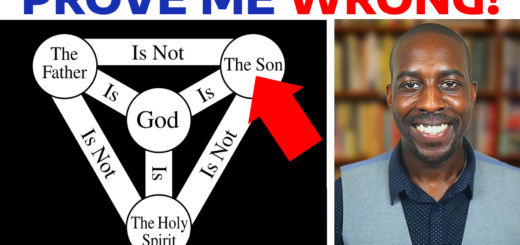Analyzing Rabbi Tovia Singer’s Views on the Trinity
In the ongoing discourse surrounding the concept of the Trinity within Christianity, notable figures like Rabbi Tovia Singer have made significant arguments questioning its validity.
Recently, Rabbi Singer released a video titled “Rabbi Tovia Singer Destroys Christian Doctrine of the Trinity,” prompting a need for thorough examination and response.
In this post, we’ll analyze the claims made by Rabbi Singer, ensuring that we capture the context of the discussion while also addressing the Biblical references that underpin these Theological topics.
The Question of God’s Nature
At the core of this debate is a fundamental question: ”Can God become man?”
During the video, a caller posed a question referencing Exodus, asking whether the Tanakh specifically declares that God cannot or will not take human form.
The short answer is that there are no explicit verses in the Tanakh stating that God cannot become man. On the contrary, God is portrayed as limitless in power, able to manifest as He wishes.
However, Rabbi Singer specifically quoted 1 Samuel 15:29, where it states,
“The Glory of Israel will not lie or change His mind, for He is not a man.”
Despite the caller saying to specifically not mention these types of verses, Rabbi Tovia Singer still did.
This verse simply says God is not a man that He should lie. It does not imply that God could not choose to appear in human form. Christians believe God possesses the ultimate authority to present Himself in any form He chooses, as illustrated in various Biblical passages.
 Contextual Understanding
Contextual Understanding
Rabbi Singer further elaborates on the Hebrew words associated with “man” in the Bible. He discusses the nuances of these words, particularly focusing on the term “Adam,” which refers to humanity rather than a specific gender.
While this linguistic exploration is essential, it does not negate the interpretations provided in other Scriptures where God appears in human form.
One of the most compelling examples comes from the book of Ezekiel. He recounts a profound vision of God’s throne, where it is noted that the one who sat on the throne above the firmament “was the likeness as the appearance of a man above upon it.”
“And above the firmament that was over their heads was the likeness of a throne, as the appearance of a sapphire stone: and upon the likeness of the throne was the likeness as the appearance of a man above upon it.” – Ezekiel 1:26
This uses the same word Rabbi Singer just said shows in 1 Samuel that God is not man, or cannot become man, or will not become man.
If, as Rabbi Singer suggests, God appearing as a man contradicts His nature, then what did Ezekiel witness? This vision offers a compelling argument supporting the Christian understanding that God has the capacity to reveal Himself as a man.
The Role of Angels
Rabbi Singer also delves into the roles of angels within the Tanakh, suggesting that angels are frequently called God. Though it is true that angels and other people are referred to as “Elohim”, the key Theological argument Christians make is about one specific angel or messenger who is called “Y H W H”.
“And an Angel of the Lord came up from Gilgal to Bochim, and said, I made you to go up out of Egypt, and have brought you unto the land which I sware unto your fathers; and I said, I will never break my covenant with you. – Judges 2:1
This suggests continuity in the way God interacts with humanity, thus affirming the possibility of God’s manifestation through this messenger without undermining His divine nature.
 Jacob’s Encounter with God in Genesis
Jacob’s Encounter with God in Genesis
In Genesis 32:30, Jacob wrestles with a being whom he later identifies as God, stating,
“And Jacob called the name of the place Peniel: for I have seen God face to face, and my life is preserved.” – Genesis 32:30
Rabbi Singer counters this by referencing Hosea 12:4, which calls this figure an angel, suggesting that Jacob was interacting with a messenger, not God directly.
Rabbi Singer forces a wooden interpretation of the word “messenger” into the text. The word “messenger” doesn’t speak to a person’s nature; only to the message that they bring.
“Yea, he had power over the Angel, and prevailed: he wept, and made supplication unto him: he found him in Bethel, and there he spake with us.” – Hosea 12:4
Hosea’s account does not contradict Genesis but rather provides an additional layer of insight. This is especially clear when you read Hosea 12:3-5. Then it’s clear that Hosea lines up with Moses in Genesis that this angel is God.
Christians see Jacob’s statement as a testament to his unique encounter with God, affirming that divine manifestations were not impossible within the scope of the Tanakh.
Moses at the Burning Bush: God’s Name and Presence
The encounter of Moses with God in the burning bush (Exodus 3) is foundational to both Jewish and Christian theology. Rabbi Singer discusses Exodus 3:12 and Exodus 3:14, focusing on God’s self-declaration as “I Am” (Ehyeh).
“And God said unto Moses, I Am That I Am: and He said, Thus shalt thou say unto the children of Israel, I Am hath sent me unto you.” – Exodus 3:14
Engaging with the Text
It’s important to approach discussions about God’s nature with diligence and an open heart. While Rabbi Singer offers arguments, they do not dismiss what the Bible actually says.
And if you want to know if the Trinity is Biblical or just a bad belief, you can check out this article to learn more. God bless.
WATCH THE VIDEO
























Recent Comments